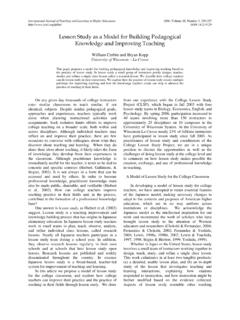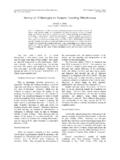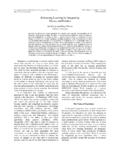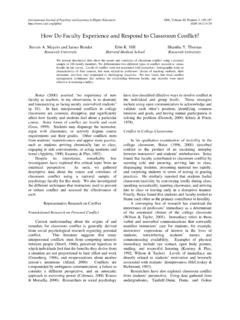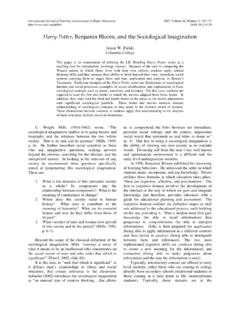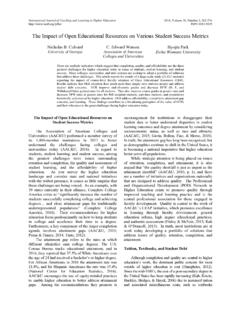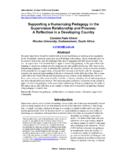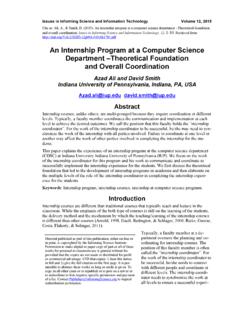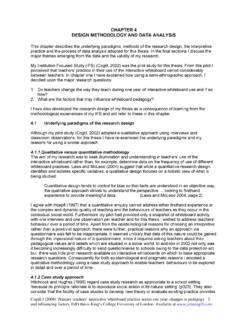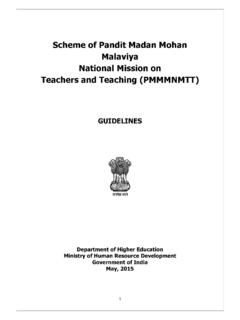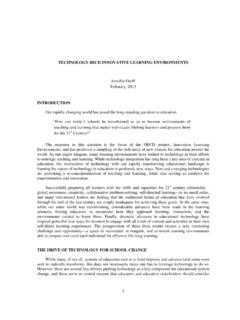Transcription of A Practical and Progressive Pedagogy for Project …
1 International Journal of Teaching and Learning in Higher Education 2007, Volume 19, Number 2, 191-204 ISSN 1812-9129 A Practical and Progressive Pedagogy for Project Based Service Learning Robert Hugg and Scott Wurdinger Minnesota State University, Mankato This article explores the use of a new teaching and learning model that incorporates diverse Progressive teaching methods to create an innovative tool for educators. The Partnership For Learning Model (PFLM), was created specifically for service learning students, community partners, and faculty with a carefully choreographed series of classroom exercises This model, along with its corresponding exercises and assignments, may be applied to a wide range of professional, academic courses that will enhance student's life skills and provide real world benefits for the communities where it is used.
2 John Dewey (1938), the architect of American Progressive education, described education as involving the full range of the students life experiences, not just the academic experience. More simply, he believed education was a deeply, perhaps inextricably intermingled, social phenomenon that served to reinforce the aims and methods of society as a whole. A foundational principle of Dewey's was that, to effectively participate in education, a student must be able to experience education in the context of life.
3 A context-rich environment would, Dewey believed, make the process both meaningful and ultimately more Practical and applicable for the student. The student and society would gain in equal measure (Dewey, 1900). Unfortunately, Dewey's philosophy appears to have been largely ignored in today's formal education settings because currently there is a clarion call throughout America that education is in crisis (Bridgeland, DiIulio, & Morison, 2006). The question of the level of meaningfulness of education is under close scrutiny from inside schools and colleges as well as from individuals outside (Bickman, 2003).
4 Feedback from students is clear: hands on, Practical application is needed more than lecture and theory (Astin, 1993; Levine & Cureton, 1998; Sax, Keup, Gilmartin, Stolzenberg, & Harper, 2002; Schroeder, 1993). Feedback from prospective employers is equally clear: being book smart is not enough; students need Practical skills prior to graduating from college (Busse, 1992; Brown. & Hesketh, 2004; Coplin, 2003; NACE, 2005). Understanding theory is important, but lacking experience in a rapidly shifting global economy does not bode well when trying to get a job after graduation.
5 Competition for jobs is fierce for new graduates; a well rounded resume, heavily laden with academic success, is just the first step for a call to interview. Real world experience that is both Practical and marketable is often the difference between a job offer and a polite, Have a good day -- good luck in your future endeavors. As a result, the all too frequent lament of students is, How do I get experience unless I have experience? Students know they need experience, but what experience is the right experience to be competitive, and how do they get that experience?
6 Conversely, employers face an equally difficult dilemma. They have the need for skilled employees who not only have technical skills but a host of Practical and life skills as well, and they cannot afford the months of effort required to train a recent graduate to effectively join their workforce. Many employers have needs that require more than a traditional college education; these needs include experience with teamwork, Project skills, organizational skills, communication skills, time management and an understanding of leadership and followership.
7 Seasoned professionals use these skills with ease, an unconscious extension of their lifelong training and experience, but to neophyte graduates these skills are alien, even incomprehensible. Being "booksmart" is one thing, while demonstrating professional skills needed to perform a job is quite another. This situation may leave students and employers alike pondering the question, Is a college education enough? A new model combining effective teaching and learning techniques in thoughtfully designed and innovative ways may solve this riddle.
8 Students and their educators face a distinctly unique challenge: how does one gain Practical real world experience in disciplines rich in theory, technology, and methodology? This article will examine a new Progressive learning model, The Partnership For Learning Model (PFLM), designed with educators, students and employers in mind. This model seeks to bridge academic experience with real life experience, thereby making formal education more meaningful and portable.
9 The PFLM, simply put, is a teaching approach that combines theory with direct experience. Service learning projects drive the curriculum, and once these projects are identified, all subsequent classroom learning focuses on bringing these projects to fruition. For instance, developing garden plots for a local community requires students to work together with city administrators and local organizations, such as Chambers of Commerce, in order Hugg and Wurdinger Practical and Progressive 192 to bring their Project to completion.
10 Here are several active approaches to learning, rooted in Dewey's philosophy of Progressive education, that are used with the PFLM: Project -Based Learning: Project -based learning is an instructional method centered on the learner. Instead of using a rigid lesson plan that directs a learner down a specific path of learning outcomes or objectives, student designed projects allow for in-depth investigation of a topic worth exploring (Harris & Katz, 2001; Katz & Chard, S.)
